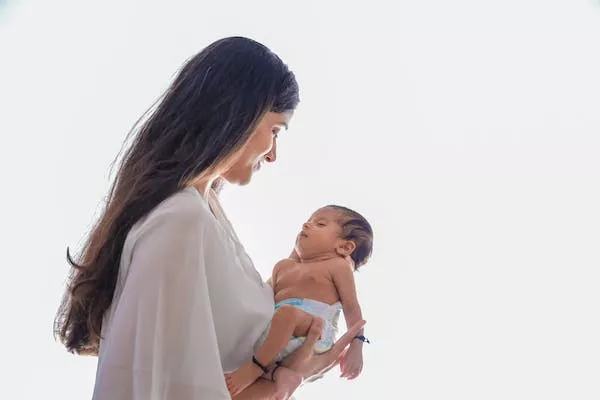Motherhood is a journey filled with numerous decisions, and one of the critical choices many new mothers face is whether to breastfeed their newborns. While breastfeeding offers a range of benefits for both the baby and the mother, it’s important to understand what might happen if you choose not to breastfeed. In this article, we’ll delve into five key aspects of what happens to your breasts if you don’t breastfeed.
1. Hormonal Changes and Engorgement
When you decide not to breastfeed, your body goes through a series of hormonal changes. The hormone prolactin, responsible for milk production, decreases over time. This decrease triggers an adjustment in your breast tissue, leading to engorgement. Engorgement occurs as your breasts fill with milk, becoming tender, swollen, and uncomfortable. To alleviate this discomfort, wearing a well-fitted supportive bra and using cold compresses can provide relief.
2. Increased Risk of Mastitis
Mastitis, an inflammation of breast tissue, can occur whether or not you breastfeed. However, the risk may be slightly higher in women who don’t breastfeed. When milk accumulates and isn’t adequately emptied, it can lead to infection. Symptoms of mastitis include redness, warmth, and pain in the breasts, often accompanied by flu-like symptoms such as fever and chills. Consulting a healthcare professional and possibly taking antibiotics can help treat mastitis.
3. Changes in Breast Size and Shape
Not breastfeeding might lead to changes in breast size and shape over time. Breasts may become softer and appear slightly smaller due to the absence of milk production and the gradual reduction in breast tissue. It’s important to note that breasts can naturally change over time for various reasons, and not breastfeeding is just one factor that could contribute to these changes.
4. Prolonged Discomfort and Weaning Challenges
Deciding not to breastfeed can result in prolonged discomfort during the weaning process. When milk production is not gradually reduced through breastfeeding or pumping, the breasts may take longer to adjust. This can lead to a more uncomfortable weaning experience for both the mother and the baby. It’s important to approach weaning with patience and seek guidance from a healthcare provider if needed.
5. Potential Impact on Long-Term Breast Health
Breastfeeding has been associated with potential long-term benefits for breast health, such as a reduced risk of certain breast conditions. Not breastfeeding, however, may slightly alter this equation. Some studies suggest that breastfeeding may offer protection against breast cancer and other breast-related issues. While not breastfeeding doesn’t guarantee the development of these conditions, it’s worth considering as part of your overall health decisions.
In conclusion, the decision to breastfeed or not is a deeply personal one, and each mother’s circumstances are unique. While not breastfeeding may lead to hormonal changes, engorgement, and other potential challenges, it’s important to approach this decision with compassion and awareness of your body’s needs. Consulting with a healthcare professional can provide valuable guidance as you navigate this aspect of motherhood.
Remember, regardless of whether you choose to breastfeed or not, your well-being and your baby’s well-being are of utmost importance. Prioritize self-care, make informed decisions, and trust your instincts as you embark on this remarkable journey of motherhood.
FAQs about what happens to your breasts if you don t breastfeed
Q: What happens to your breasts if you don’t breastfeed?
A: If you choose not to breastfeed, your breasts will still undergo some changes, but they may be different from those of someone who breastfeeds.
Q: Will my breasts become engorged if I don’t breastfeed?
A: Engorgement can occur whether or not you breastfeed. If you don’t breastfeed, your breasts may become engorged with milk initially, but your body will gradually reabsorb the milk, and the engorgement will decrease over time.
Q: Will my breasts sag if I don’t breastfeed?
A: Breast sagging is influenced by various factors, including genetics, age, weight fluctuations, and pregnancy. While breastfeeding can cause temporary changes in breast shape and size, not breastfeeding is not a guaranteed factor in breast sagging.
Q: Can not breastfeeding affect my risk of breast cancer?
A: Breastfeeding has been associated with a reduced risk of breast cancer, but the relationship is complex and influenced by other factors as well. Not breastfeeding does not automatically mean you will develop breast cancer.
Q: Will my breasts stay larger if I don’t breastfeed?
A: Breasts can become larger during pregnancy due to hormonal changes, regardless of whether you breastfeed. After childbirth, your breast size may decrease over time whether you breastfeed or not.
Q: Can not breastfeeding lead to discomfort or pain?
A: Not breastfeeding can lead to breast discomfort or engorgement as your milk supply adjusts to not being used. This discomfort typically subsides as your body reabsorbs the milk.
Q: Can I still bond with my baby if I don’t breastfeed?
A: Bonding with your baby is not solely dependent on breastfeeding. There are numerous ways to create a strong bond, such as skin-to-skin contact, holding, cuddling, and interacting with your baby.
Q: Can I still produce breast milk if I don’t breastfeed?
A: Your body will typically produce breast milk in response to pregnancy, regardless of whether you breastfeed. If you don’t breastfeed, your milk supply will gradually decrease as your body reabsorbs the milk.
Q: Can not breastfeeding impact my hormonal balance?
A: Hormonal changes after pregnancy and childbirth can occur whether you breastfeed or not. Hormonal fluctuations are a natural part of the postpartum period.
Q: Will not breastfeeding affect my future fertility?
A: Not breastfeeding does not necessarily impact future fertility. Your menstrual cycle and fertility may return at different times for different individuals, regardless of breastfeeding.



